Artificial Intelligence (AI) is transforming industries across the board, and Human Resources (HR) is no exception. AI is redefining how HR professionals operate by streamlining workflows, improving decision-making, and enhancing employee experiences. Here’s a look at how AI is changing HR processes and shaping the future of workforce management.
Recruitment and Talent Acquisition
One of the most significant ways AI is impacting HR is through recruitment and talent acquisition. AI-powered tools can scan thousands of resumes and applications in a fraction of the time it would take a human recruiter, helping to identify the best candidates based on specific criteria.
- Resume Screening: AI can automatically filter resumes, searching for keywords, qualifications, and experience levels that match job requirements. This ensures that only the most qualified candidates make it through to the next stage, reducing the manual effort required for screening.
- Chatbots for Initial Engagement: AI-driven chatbots can engage with candidates during the recruitment process, answering questions, scheduling interviews, and even conducting initial screening conversations. This reduces the workload for HR teams and provides candidates with instant responses.
- Bias Reduction: By using AI to assess candidates based on data alone, companies can reduce unconscious biases in recruitment, fostering more diverse and inclusive workplaces.
Employee Onboarding
AI has also revolutionized the onboarding process, making it more efficient and personalized. AI-driven systems can guide new hires through a structured onboarding journey, ensuring they have all the necessary information and resources to succeed.
- Automated Onboarding Platforms: AI tools can automate many aspects of onboarding, such as document submission, training modules, and benefits enrollment, allowing HR professionals to focus on more strategic tasks.
- Personalized Learning Pathways: AI can create customized training programs based on an employee’s role and skills, ensuring that new hires receive the right information and support at every stage of the onboarding process.
Performance Management
AI is transforming performance management by providing more accurate, real-time insights into employee productivity and engagement. It helps HR teams make data-driven decisions and offers employees a clearer understanding of their performance.
- Continuous Feedback: Instead of relying on annual reviews, AI-powered platforms allow for continuous feedback, giving employees timely insights on their performance and areas for improvement.
- Data-Driven Performance Insights: AI can analyze vast amounts of data to assess employee performance and productivity trends, helping managers make informed decisions about promotions, raises, or areas where training is needed.
Learning and Development
AI is playing a key role in personalizing learning and development programs. By analyzing employee skills and career goals, AI can recommend targeted training and upskilling opportunities that align with both the employee’s and the company’s objectives.
- Personalized Learning Paths: AI-driven learning management systems can tailor training programs to individual needs, ensuring employees get the most relevant skills training based on their roles and aspirations.
- Predictive Analytics for Skill Gaps: AI can predict future skill gaps in the workforce by analyzing industry trends and employee development. HR can use this information to plan future training programs or hire new talent.
Employee Engagement and Retention
AI tools can analyze employee sentiment and engagement levels, helping HR teams proactively address issues before they lead to attrition. This is particularly useful for maintaining a motivated and satisfied workforce.
- Sentiment Analysis: AI can analyze employee feedback from surveys, emails, or social media to detect signs of disengagement, burnout, or dissatisfaction. This allows HR teams to intervene early and implement strategies to improve morale.
- Predictive Retention Models: By analyzing employee data, AI can identify patterns that indicate when an employee might be at risk of leaving. HR teams can then take action, such as offering development opportunities or conducting one-on-one check-ins to retain top talent.
HR Analytics and Decision-Making
AI-driven analytics are helping HR professionals make smarter, data-driven decisions. Whether it’s predicting hiring needs, identifying high-potential employees, or optimizing compensation strategies, AI offers valuable insights to improve HR effectiveness.
- Predictive Workforce Analytics: AI can forecast hiring needs, skill shortages, and workforce trends, enabling HR teams to plan more effectively for future workforce demands.
- Data-Driven Decision Making: AI allows HR teams to leverage data for decisions on everything from compensation to employee benefits, ensuring that policies are fair, competitive, and aligned with business goals.
Compliance and Risk Management
HR teams are responsible for ensuring that their organization complies with local labor laws and regulations. AI can assist in maintaining compliance by automatically monitoring and flagging potential risks.
- Automated Compliance Monitoring: AI tools can track changes in labor laws and company policies, ensuring that HR teams are up-to-date on all compliance issues.
- Risk Management: AI can predict potential HR-related risks, such as legal disputes or compliance violations, helping HR teams address these issues proactively.
Conclusion
AI is reshaping HR processes, allowing HR professionals to work more efficiently and strategically. By automating routine tasks, providing data-driven insights, and personalizing employee experiences, AI is helping HR teams focus on what truly matters—developing and nurturing talent. Embracing AI in HR can lead to a more engaged workforce, better decision-making, and a stronger organization.

